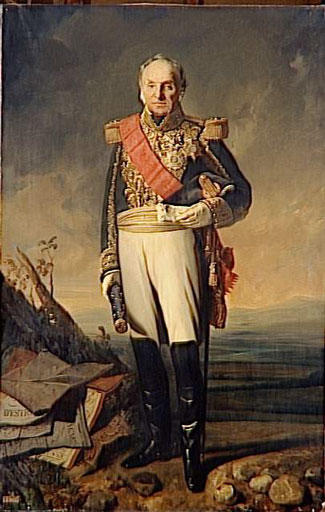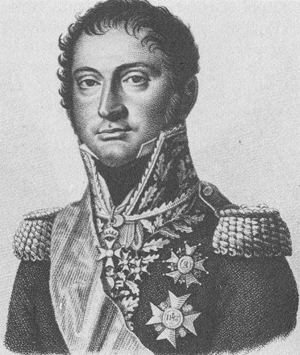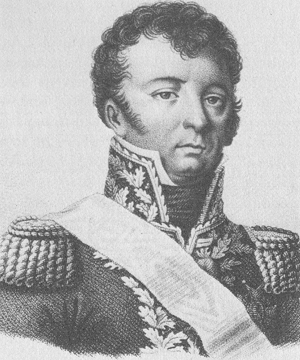<Back to Index>
- Commander of the I Corps Marshal of France Jean - Baptiste Drouet, Comte d'Erlon, 1765
- Commander of the II Corps Marshal of France Honoré Charles Michel Joseph Reille, 1775
- Commander of the III Corps General Dominique - Joseph René Vandamme, 1770
PAGE SPONSOR

Jean - Baptiste Drouet, comte d'Erlon (July 29, 1765 – January 25, 1844) was a marshal of France and a soldier in Napoleon's Army. D'Erlon notably commanded the I Corps of the Armée du Nord at the battle of Waterloo.
D'Erlon was born in Reims, and in 1792 served as a corporal in the pre - revolutionary army, being elected to captain the following year. In 1794 he returned to Reims to marry Marie - Anne Rousseau the daughter of Nicolas Rousseau a banker, who he had got to know through Marie - Jeanne (Rousseau), the wife of his brother Jean - François Drouet. While in Reims on the morning of his wedding, he was informed of his appointment as aide - de - camp to General Francois Lefebvre. On Christmas Day 1794, his first child, a son who was christened Nicolas Adolphe was born. In 1796 his wife had their second child, a daughter: Marie - Anne Louise.
In 1799 he was promoted to brigadier general, and fought under André Masséna in Switzerland. The same year he distinguished himself at the Second Battle of Zurich. In 1800 he moved his family to Paris where his third child Aimé Napoleon François was born. He continued his service in many battles of the French Revolutionary and Napoleonic Wars, including Hohenlinden in 1800 (in which he was wounded), the Hanover region (earning him promotion to Major General in 1803), Austerlitz in 1805 (his first battle as Division commander) and one in which his division played a pivotal role, and Jena in 1806.
In 1807, as chief of staff for Lefebvre at the siege of the Polish city of Danzig (Gdańsk), he negotiated the terms of surrender. The same year he was wounded in the foot at Friedland.
Following the conclusion of the 1809 Danubian campaign, D'Erlon was sent as Chief of Staff to Marshal Lefebvre. Lefebvre was in command of the VII (Bavarian) Corps in action in the Tyrol against the pro - Austrian insurgency led by the innkeeper Andreas Hofer. After the failure of the allied second offensive to retake the Tyrol, Lefebvre was relieved of his command by Napoleon because of his poor performance and terrible relationship with the Bavarians. D'Erlon was given command, and by the end of November he had pacified the region, and in the process formed a strong bond with his Bavarian subordinates.
Later in the year he was given the command of the IX Corps of Spain, after which he defeated the British General Hill at the Battle of Extremadura. The following years brought him successes in Portugal, and in the Peninsular War.
After Napoleon abdicated in 1814 d'Erlon transferred his allegiance to the House of Bourbon along with the rest of the army. The next year he accepted the command of the 16th Military Division under Napoleon from Marshal Davout.
During the Waterloo Campaign d'Erlon commanded the French I Corps. On June 16, 1815, due to conflicting orders his Corps spent the day on the Nivelles - Namur road marching and counter marching between the battles of Quatre Bras and Ligny without engaging in either battle. If the I Corps had engaged in either battle the outcome of the campaign might have been different. Two days later at the Battle of Waterloo it was his Corps in Column formation which attacked the Allied center near La Haye Sainte at 13:30 and was stopped by Picton's Peninsular War veterans, and then attacked in the flanks by the British heavy cavalry. After the surrender of Napoleon, d'Erlon entered exile in Munich.
In 1825 he was granted amnesty by Charles X. In 1828 his wife Marie - Anne died. In the July Revolution in 1830 he supported the Juilletistes was given the Great Order of the Legion of honor by Louis - Philippe on November 19, 1831 and in 1832 was given the command of the 12th Division in Nantes. Later in the year his division suppressed a Vendean revolt and arrested the Duchess of Berry.
In 1834 d'Erlon was named governor general of Algeria, although after the defeat of the French army under General Camille Alphonse Trezel on the banks of the Macta in 1835, D'Erlon was recalled to France and replaced.
From 1837 he resumed his command of the 12th Division in Nantes a
position he held until 1843 when he moved to Paris to retire and was
granted the title marshal of France on April 9, 1843. He died in January
of the following year.

Honoré Charles Michel Joseph Reille (1 September 1775 - 4 March 1860) was a Marshal of France, born in Antibes.
Reille served in the early campaigns of the French Revolutionary Wars under Dumouriez and Masséna, whose daughter Victoire he married. In 1800, Reille was appointed commander of the Italian city of Florence. Promoted to general de brigade in 1803, he commanded the allied troops of Württemberg during the War of the Third Coalition in 1805. He served in the battles of Jena, Pultusk and Ostrolenka and served as aide - de - camp to Napoléon at Friedland.
In 1808 Reille partook in the campaign in Spain, the next year he participated in the battles of Aspern and Wagram. After Wagram, he was sent back to Spain, where until 1812 he commanded in Navarre and Aragon. By 1813 he was given command of the Army of Portugal which he commanded in the Battle of Vitoria but was defeated.
After the fall of Napoléon in 1814, the Bourbons made Reille inspector general of the 14th and 15th Infantry Divisions. During the Hundred Days, he rallied to Napoléon and was given command of II Corps, which he led in the battles of Quatre Bras and Waterloo.
In 1819 he was made a Peer, in 1847 he was made a Marshal of France
and in 1852 he was made a Senator. Reille died in 1860 in Paris and was
buried at Père Lachaise, in the same tomb as Masséna.

General Dominique - Joseph René Vandamme, Count of Unseburg (5 November 1770, Cassel, Nord – 15 July 1830) was a French military officer, who fought in the Napoleonic Wars.
Reportedly a brutal and violent soldier, renowned for insubordination and looting, Napoleon is said to have told him, "If I had two of you, the only solution would be to have one hang the other". Napoleon added that he would give Vandamme command of the vanguard were he (Napoleon) to launch a campaign against Lucifer in Hell.
Vandamme enlisted in the army in 1786 and rapidly rose through the ranks. At the outbreak of the French Revolutionary Wars in 1793 he was a Brigadier General. He was court martialled for looting and suspended. Reinstated, he fought at the First Battle of Stockach on 25 March 1799, but disagreement with General Jean Moreau led to his being sent to occupation duties in Holland. At the Battle of Austerlitz in 1805 he led the charge that recaptured the Pratzen Heights.
He was named Count of Unseburg by Napoleon I after the Silesian campaign during the War of the Fourth Coalition. In the campaign of 1809, he fought in the battles of Abensberg, Landshut, Eckmuhl.
In the campaign of 1813 Vandamme's division was encircled by the Prussian General Kleist at Kulm and 13,000 men were captured, including Vandamme himself. Taken to Tsar Alexander I of Russia, Vandamme was accused of looting, but is alleged to have replied, "I am neither a plunderer nor a brigand but in any case, my contemporaries and history will not reproach me for having soaked my hands in the blood of my father" (an allusion to the murder of Paul I of Russia).
In the campaign of 1815 he was in command of the 3rd Corps, under the direction of Marshal Grouchy. He urged Grouchy to join Napoleon at the Battle of Waterloo, but Grouchy preferred to pursue the Prussian 3rd Corps under General Johann von Thielmann, winning the Battle of Wavre, but losing the war. After the restoration of Louis XVIII of France Vandamme was exiled to America and settled in Philadelphia amongst other French military exiles. General Vanmdamme was allowed to return by the ordinance of 1 December 1819. He was reestablished in the service in the Ètat - major Général, until his final retirement on 1 January 1825. Afterwards he lived alternatively in Cassel and Ghent, occupying himself with the writing of his Memoirs. He died in his native Cassel, aged 59. His name is inscribed on the North side of the Arc de Triomphe.